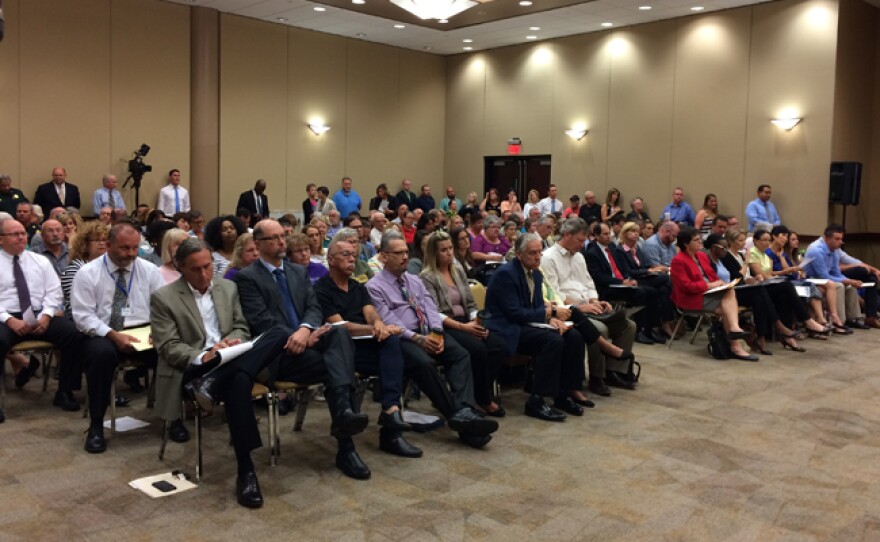More money is needed to stop overdose deaths, Manatee County leaders told state officials during an opioid workshop Tuesday.
Emergency responders need funding for Narcan, a medication that reverses overdoses. Treatment facilities need more beds, hospitals need support to treat babies born addicted to opioids and addicts need help paying for treatment.
“My deputies are finding these victims in parking lots and in bathrooms of restaurants throughout the county and they start lifesaving measures until EMS arrives,” Manatee County Sheriff Rick Wells told leaders from the Department of Health, Department of Law Enforcement and the Department of Children and Families.
More than 150 people from the community packed the Bradenton Area Convention Center in Palmetto for the opioid workshop, which was one of four being held around Florida.
Gerrie Stanhope lost five family members to overdoses. Her son died after trying to get treatment and being turned away for lack of space.
Treatment centers need more capacity and addicts need support to attend treatment that lasts beyond a couple weeks, she said.
"We've had meetings, meetings, talks, talks, we need to stop talking we need to act, we need it now,” Stanhope said. “We need a state of emergency for this county, for the state."
The state received notice last week that it was awarded a $54 million federal grant to fight opioid addiction in Florida. The money will provide medication and treatment and will be distributed to communities based on need starting next month, DCF secretary Mike Carroll said.
"A community like Manatee, which has been particularly hard hit by this issue would receive a bigger share of that funding," Carroll said.
With thousands of people dying from opioid overdoses around the state, Gov. Rick Scott has been pressured to issue a state of emergency like he did last year with Zika.
Surgeon General Celeste Philip said the workshops, which were also being held in West Palm Beach, Orlando and Jacksonville, will help determine whether a public health emergency is needed for the opioid crises.
"Public health emergencies are linked to specific actions,” Philip said. “It's not just a statement that it is an emergency but it says because of that we're going to do A, B and C. The point of the workshops was to hear what some of those actions might be.”
State leaders heard about the effects drug addiction is having in jails, schools and in the homes of children with parents who are addicts.
In 2012, 94 children in Manatee were removed from their homes. In 2015, that figure jumped to 596 children. So far this year, more than 100 children have been removed from their homes.
In 2016 there were more than 3,000 drug-related criminal charges in Manatee County. So far this year, there were nearly 1,000 drug-related arrests, said Manatee County Clerk Angel Colonneso.
But members of the audience stressed that the way to solve the problem is not to arrest addicts who are suffering from a disease.
Doctors should be pushed to prescribe fewer opioids, addiction specialists said, and insurance companies should be forced to pay for treatment.
Florida Department of Law Enforcement Assistant commissioner Don Ladner said his agency is focusing on those trafficking the drugs, not addicts.
“We will not arrest our way out of this situation,” he said. “We need to deal with those who are suffering from addiction but we also need to address those who are marketing to them and putting their lives in danger. Those are the groups we are seeking to arrest.”



